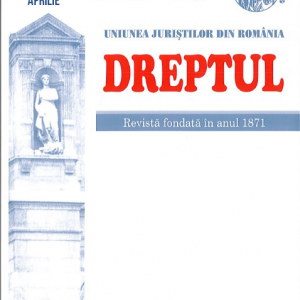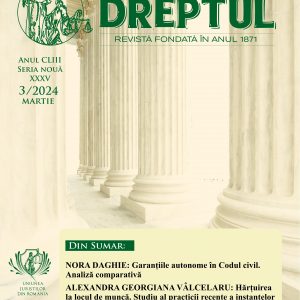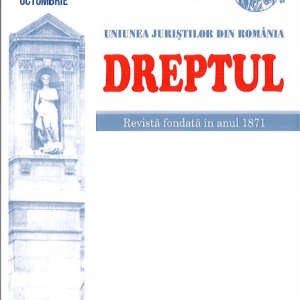-
 According to art. 147. (4) of the Constitution, the Constitutional Court rulings are generally binding. Therefore, the public authorities, including courts, regardless of their level, must observe the Constitutional Court rulings both in terms of the operative part and recitals thereof. Although they do not constitute a source of law, the High Court of Cassation and Justice judgments rendered after settlement of an appeal in the interest of law, require the courts a particular solution to a law issue, therefore an interpretation of legal rules. When performing the interpretation and application of law, a contingent conventionality control also occurs; such control is carrying out by this Court whilst assuming that the courts’ divergent practice is given by the different application of the (European) Convention on human rights and fundamental freedoms provisions. Not infrequently, the High Court of Cassation and Justice’s jurisprudence on the matters submitted to trial did not coincide with that of the Constitutional Court, and this study aims to point out and analyze such cases. The proposed solution takes into account a possible constitutionality review of the previously reported judgments of the High Court of Cassation and Justice; such control has already been carried out indirectly in certain rulings of the Constitutional Court.
According to art. 147. (4) of the Constitution, the Constitutional Court rulings are generally binding. Therefore, the public authorities, including courts, regardless of their level, must observe the Constitutional Court rulings both in terms of the operative part and recitals thereof. Although they do not constitute a source of law, the High Court of Cassation and Justice judgments rendered after settlement of an appeal in the interest of law, require the courts a particular solution to a law issue, therefore an interpretation of legal rules. When performing the interpretation and application of law, a contingent conventionality control also occurs; such control is carrying out by this Court whilst assuming that the courts’ divergent practice is given by the different application of the (European) Convention on human rights and fundamental freedoms provisions. Not infrequently, the High Court of Cassation and Justice’s jurisprudence on the matters submitted to trial did not coincide with that of the Constitutional Court, and this study aims to point out and analyze such cases. The proposed solution takes into account a possible constitutionality review of the previously reported judgments of the High Court of Cassation and Justice; such control has already been carried out indirectly in certain rulings of the Constitutional Court. -

-
 Pursuant to Art. 147, paragraph (4) of the Romanian Constitution republished on October 31, 2003, “Rulings of the Constitutional Court shall be published in the Official Gazette of Romania. As from their publication, rulings shall be generally binding and effective only for the future”, and pursuant to Art. 147 paragraph (1) of the said Constitution, the provisions of the laws, ordinances and regulations in force found to be unconstitutional shall cease their legal effects within 45 days of the publication of the decision of the Constitutional Court if, in the meantime, the Parliament or the Government, as the case may be, cannot bring into line the unconstitutional provisions with the provisions of the Constitution.. Under these constitutional requirements, the study’s authors comprehensively examine the casuistry these rules have generated, the Constitutional Court jurisprudence in the matters and so on, and the delicate situation arisen because neither the Constitution nor any other law expressly regulates the state of laws or Government ordinances (no longer existing) declared unconstitutional.
Pursuant to Art. 147, paragraph (4) of the Romanian Constitution republished on October 31, 2003, “Rulings of the Constitutional Court shall be published in the Official Gazette of Romania. As from their publication, rulings shall be generally binding and effective only for the future”, and pursuant to Art. 147 paragraph (1) of the said Constitution, the provisions of the laws, ordinances and regulations in force found to be unconstitutional shall cease their legal effects within 45 days of the publication of the decision of the Constitutional Court if, in the meantime, the Parliament or the Government, as the case may be, cannot bring into line the unconstitutional provisions with the provisions of the Constitution.. Under these constitutional requirements, the study’s authors comprehensively examine the casuistry these rules have generated, the Constitutional Court jurisprudence in the matters and so on, and the delicate situation arisen because neither the Constitution nor any other law expressly regulates the state of laws or Government ordinances (no longer existing) declared unconstitutional. -
 Following the effective date of the Civil Code (Law no. 287/2009, as republished) as at the 1st of October 2011, which repealed the Family Code, and the adequate amendment and of the Law no. 119/1996 regarding the civil status acts, as republished, in this paper the author examines the legal provisions regarding the effects of the dissolution of marriage by divorce, making certain references to the late relevant case law of the courts of law. This paper examines mainly, the legal provisions regulated by articles 382-404 of the Civil Code.
Following the effective date of the Civil Code (Law no. 287/2009, as republished) as at the 1st of October 2011, which repealed the Family Code, and the adequate amendment and of the Law no. 119/1996 regarding the civil status acts, as republished, in this paper the author examines the legal provisions regarding the effects of the dissolution of marriage by divorce, making certain references to the late relevant case law of the courts of law. This paper examines mainly, the legal provisions regulated by articles 382-404 of the Civil Code. -
 According to the Romanian legislation in the field, which existed prior to the entry into force of the new (Romanian) Code of Civil Procedure (15 February 2013) and labor addressing conflicts (disputes), the tribunal was usually the first instance court having jurisdiction to hear and the court of appeal had jurisdiction only on a single remedy at law (the appeal). After the entry into force of the new Code of Civil Procedure (Law no. 134/ 2010, republished on 3 August 2012), the situation has changed in that against the sentence of the first instance court (the tribunal) there is (except for the revision) a single remedy at law i.e. the appeal (within the Court of Appeal jurisdiction), appeal which is an ordinary, devolutive remedy at law. In this study, the authors analyze this situation stressing that, in principle, is the better for the parties to have nothing but the appeal (besides the revision) as remedy at law, instead of solely the recourse.
According to the Romanian legislation in the field, which existed prior to the entry into force of the new (Romanian) Code of Civil Procedure (15 February 2013) and labor addressing conflicts (disputes), the tribunal was usually the first instance court having jurisdiction to hear and the court of appeal had jurisdiction only on a single remedy at law (the appeal). After the entry into force of the new Code of Civil Procedure (Law no. 134/ 2010, republished on 3 August 2012), the situation has changed in that against the sentence of the first instance court (the tribunal) there is (except for the revision) a single remedy at law i.e. the appeal (within the Court of Appeal jurisdiction), appeal which is an ordinary, devolutive remedy at law. In this study, the authors analyze this situation stressing that, in principle, is the better for the parties to have nothing but the appeal (besides the revision) as remedy at law, instead of solely the recourse. -
 Article hereby deals with the legal effects of Decision No. 573/2011 of the Constitutional Court on the plea of unconstitutionality of the provisions of Article 74¹ of the Criminal Code, focusing on its consequences in terms of reinforcing provisions of Article 10 of Law No. 241/2005 on preventing and combating tax evasion, as subsequently amended and supplemented.
Article hereby deals with the legal effects of Decision No. 573/2011 of the Constitutional Court on the plea of unconstitutionality of the provisions of Article 74¹ of the Criminal Code, focusing on its consequences in terms of reinforcing provisions of Article 10 of Law No. 241/2005 on preventing and combating tax evasion, as subsequently amended and supplemented. -
 The author states that the criminal trial should take place with celerity, within a reasonable period of time, according to art. 6 of the Convention for the Protection of Human Rights and Fundamental Freedoms. In this context, the submission by the defendants of applications to notify the Constitutional Court of exceptions of unconstitutionality that were previously dismissed numerous times represents an abuse of right committed for the purpose of procrastinating the resolution of the cases.
The author states that the criminal trial should take place with celerity, within a reasonable period of time, according to art. 6 of the Convention for the Protection of Human Rights and Fundamental Freedoms. In this context, the submission by the defendants of applications to notify the Constitutional Court of exceptions of unconstitutionality that were previously dismissed numerous times represents an abuse of right committed for the purpose of procrastinating the resolution of the cases. -
 The letter of guarantee is regulated by the new Civil Code within the autonomous guarantees, together with the letter of comfort. It is an autonomous, unconditional and irrevocable legal deed. In the letter of guarantee, the issuer assumes its own obligation which in its relationship with the beneficiary at least, shall be main and autonomous – the payment of an amount of money upon the first simple request of the beneficiary, for the situation in which the result taken into account upon its assumption is not carried out. The execution of the letter of guarantee depends only on its own requirements and this is the criterion according to which it distinguishes basically from the deed of trust.
The letter of guarantee is regulated by the new Civil Code within the autonomous guarantees, together with the letter of comfort. It is an autonomous, unconditional and irrevocable legal deed. In the letter of guarantee, the issuer assumes its own obligation which in its relationship with the beneficiary at least, shall be main and autonomous – the payment of an amount of money upon the first simple request of the beneficiary, for the situation in which the result taken into account upon its assumption is not carried out. The execution of the letter of guarantee depends only on its own requirements and this is the criterion according to which it distinguishes basically from the deed of trust. -
 As regards the possibility to maintain conditional release if, following a merger of penalties, a penalty equal to that from which the convict was released on parole is enforced, two solutions are possible. The first solution consists in deducting only the actually served penalty and incarcerating the convicted person again, and the second solution consists in considering the entire penalty served. The resolution of the controversy depends on the opinion adopted as regards the legal nature of conditional release.
As regards the possibility to maintain conditional release if, following a merger of penalties, a penalty equal to that from which the convict was released on parole is enforced, two solutions are possible. The first solution consists in deducting only the actually served penalty and incarcerating the convicted person again, and the second solution consists in considering the entire penalty served. The resolution of the controversy depends on the opinion adopted as regards the legal nature of conditional release. -
 While examining the effects of the information procedure on the advantages of mediation in relation to the running of the prescription or limitation periods and corroborating the provisions of Law No 192/2006 referring to mediation with the provisions of the Romanian Civil Code in matters of prescription or limitation periods, this study reaches the conclusion that the procedure on the advantages of mediation prevents the running of the substantial prescription period and limitation period established by the legal provisions (which protect a private right) or by the convention of the parties when these have not began to run, and, respectively, it suspends the course of the prescription/limitation when these have began to run, for a period of 15 calendar days from the date when the prescription/limitation began.
While examining the effects of the information procedure on the advantages of mediation in relation to the running of the prescription or limitation periods and corroborating the provisions of Law No 192/2006 referring to mediation with the provisions of the Romanian Civil Code in matters of prescription or limitation periods, this study reaches the conclusion that the procedure on the advantages of mediation prevents the running of the substantial prescription period and limitation period established by the legal provisions (which protect a private right) or by the convention of the parties when these have not began to run, and, respectively, it suspends the course of the prescription/limitation when these have began to run, for a period of 15 calendar days from the date when the prescription/limitation began. -

-
 Parole was defined in Romanian doctrine as a way to individualize the execution of the custodial sentences, without deprivation of liberty, granted by the final decision of the court which are the conviction that the convicted person has been rehabilitated, as a result of meeting the required conditions during the execution of minimum statutory sentence, there is the semi-open or open regime of enforcement, the person has fulfilled his/her civil obligations, as well as subject to full fulfillment, under probation services, within supervision, of the measures and obligations. As a legal nature, the parole represents a post iudicium individualization of the execution of the custodial sentences and involves the release of the convict before the full execution of the sentence because the convict has proved that he has made obvious progress towards social reintegration. However, the parole is not a right of the convict not to serve the entire sentence, but a legal instrument by which the court finds that it is no longer necessary to continue the execution of the sentence in detention until the full period established by the final conviction has been fulfilled and the early release poses no danger to the community.
Parole was defined in Romanian doctrine as a way to individualize the execution of the custodial sentences, without deprivation of liberty, granted by the final decision of the court which are the conviction that the convicted person has been rehabilitated, as a result of meeting the required conditions during the execution of minimum statutory sentence, there is the semi-open or open regime of enforcement, the person has fulfilled his/her civil obligations, as well as subject to full fulfillment, under probation services, within supervision, of the measures and obligations. As a legal nature, the parole represents a post iudicium individualization of the execution of the custodial sentences and involves the release of the convict before the full execution of the sentence because the convict has proved that he has made obvious progress towards social reintegration. However, the parole is not a right of the convict not to serve the entire sentence, but a legal instrument by which the court finds that it is no longer necessary to continue the execution of the sentence in detention until the full period established by the final conviction has been fulfilled and the early release poses no danger to the community.
